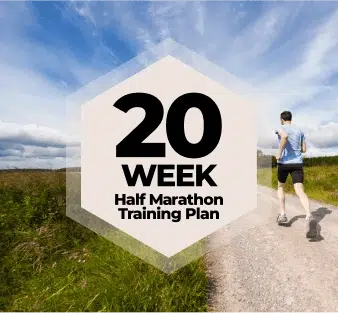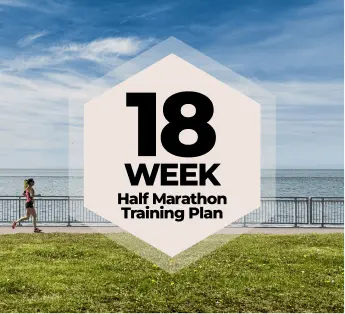If you have a very busy schedule or are nervous about building your foundation enough to reach 13.1 miles, this training schedule is great for you. Over the course of 16 weeks, you’ll run four days per week and work your way up to the full half marathon distance.
We’ve developed this training plan specifically for intermediate-level runners and people whose schedules make it hard to run five days a week. It’s a variation on our 12-week training plan for beginners which has you run five days per week.
If you have the time, already run consistently, and want to train a little more, Becky Wade Firth, a pro-marathoner, cross-country running coach, and HMG writer says you can add one other easy run per week on Wednesdays or use that day to crosstrain (more on that later).
And if you’re looking for more personalized guidance, try the Runna. Runna has dynamic training plans with encouragement and feedback from coaches to keep you prepared for your upcoming half marathon. Use code HALF for 2-weeks of free training.
16-Week Half Marathon Training Plan
| Week | Monday | Tuesday | Wednesday | Thursday | Friday | Saturday | Sunday |
| 1 | Off | 3 miles | Off | 3 miles | Off | 4 miles | 3 miles |
| 2 | Off | 3 miles | Off | 3 miles | Off | 5 miles | 3 miles |
| 3 | Off | 4 miles | Off | 4 miles | Off | 6 miles | 3 miles |
| 4 | Off | 4 miles | Off | 4 miles | Off | 6 miles | 3 miles |
| 5 | Off | 5 miles | Off | 5 miles | Off | 7 miles | 2-3 miles |
| 6 | Off | 5 miles | Off | 5 miles | Off | 7 miles | 2-3 miles |
| 7 | Off | 6 miles | Off | 4 miles | Off | 8 miles | 2-3 miles |
| 8 | Off | 6 miles | Off | 4 miles | Off | 8 miles | 2-3 miles |
| 9 | Off | 5-6 miles | Off | 4-5 miles | Off | 9 miles | 2-3 miles |
| 10 | Off | 5-6 miles | Off | 4-5 miles | Off | 9 miles | 2-3 miles |
| 11 | Off | 6 miles | Off | 5 miles | Off | 10 miles | 2 miles |
| 12 | Off | 6 miles | Off | 5 miles | Off | 10 miles | 2 miles |
| 13 | Off | 5-6 miles | Off | 4-5 miles | Off | 11 miles | 2 miles |
| 14 | Off | 5-6 miles | Off | 4-5 miles | Off | 12 miles | 2 miles |
| 15 | Off | 5-6 miles | Off | 4-5 miles | Off | 6 miles | 3 miles |
| 16 | Off | 4-5 miles | Off | 4-5 miles | Off | 13.1 miles | off |
About This Training Schedule
Who It’s for
This training plan is for beginner to intermediate runners who are already running a few miles a few days a week and who are ready to dedicate 16 weeks to a half-marathon build-up. Prior racing experience over any distance is a bonus but not a requirement.
Injury Prevention
With a 16-week training plan, you have time to gradually build mileage, which helps reduce the risk of overuse injuries. However, conditions like shin splints and plantar fasciitis can still arise if training volume or intensity increases too quickly or if your tendons and ligaments aren’t properly prepared. To minimize these risks, incorporate injury-prevention routines into your plan from the start.
Here are some key strategies:
- Cross-train regularly. Dedicating at least one non-running day per week to cross-training, such as cycling or swimming, can help you maintain cardiovascular fitness without the high-impact stress of running, Firth says. In this plan, Wednesday is a great day to cross-train.
- Prioritize rest days. It might feel tempting to fill every day with running, but rest days are crucial for recovery and reducing injury risk. If you want some movement, consider a light walk, easy cross-training, or gentle stretching to keep your muscles loose.
- Schedule in strength training. In 16 weeks, you really reap the benefits of a consistent strength training routine. Building power and strength in your lower body and core will not only enhance running power and endurance, but also protect against injuries by improving muscle strength, stability, and overall biomechanics. Grab dumbbells or kettlebells and shoot for one to two 30-minute strength training sessions per week, ideally done after a longer run (later that day or the next day).
What to Eat
For a successful 16-week half marathon plan, fueling is essential for energy, performance, and recovery. Aim for:
- 50% carb for immediate energy
- 25% protein for muscle repair
- 25% fat for long-term energy
For daily nutrition, focus on whole grains, starchy veggies, lean proteins, and healthy fats. Shorter runs (under 60 minutes) won’t require major fueling changes, but for longer runs (over 60 minutes), increase carbs the day before to boost glycogen reserves.
During long runs (over an hour), maintain energy with mid-run fueling, consuming 30-60 grams of carbs per hour from gels or chews. After your run, a 4:1 carb-to-protein recovery snack (like yogurt with fruit) within 30 minutes can speed up muscle recovery and prepare you for the next session.
For more details, read our full run-down of half marathon nutrition according to a sports dietician as well as the best snacks for runners and the best meals for runners.
More Half Marathon Training Plans
8 Weeks • 9 Weeks • 10 Weeks • 12 Weeks • 14 Weeks • 18 Weeks • 20 Weeks
–
We independently produce all the content associated with training plans we feature on HalfMarathons.net. If you buy or sign up for services through the links on our site, we may receive an affiliate commission – which in turn supports our work.





